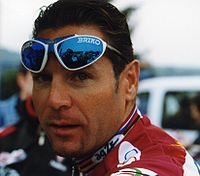Contents
| Men's road race at the Games of the XXVI Olympiad | ||||||||||
|---|---|---|---|---|---|---|---|---|---|---|
 Pascal Richard (1998) | ||||||||||
| Venue | Atlanta | |||||||||
| Date | July 31 | |||||||||
| Competitors | 183 from 57 nations | |||||||||
| Winning time | 4:53:56 | |||||||||
| Medalists | ||||||||||
| ||||||||||
| Cycling at the 1996 Summer Olympics | ||
|---|---|---|
| Road cycling | ||
| Road race | men | women |
| Time trial | men | women |
| Track cycling | ||
| Track time trial | men | |
| Individual pursuit | men | women |
| Points race | men | women |
| Sprint | men | women |
| Team pursuit | men | |
| Mountain bike | ||
| Cross-country | men | women |
The men's individual road race at the 1996 Summer Olympics in Atlanta, was held on July 31, 1996. There were 183 participants from 57 nations in the race over 221.85 km, with 116 cyclists finishing. [1] For the first time, the event was open to professionals. Previously, it was restricted to "amateurs" which included state-funded Eastern Bloc athletes. [2] The maximum number of cyclists per nation was five, up from three in previous editions of the event. The event was won by Pascal Richard of Switzerland, the nation's first victory in the men's individual road race and first medal in the event since a bronze in 1936. Rolf Sørensen earned Denmark's third medal in the event, silver just as in 1964 and 1968. Max Sciandri similarly matched Great Britain's best result: a bronze, as in 1896 and 1956.